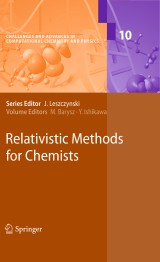Details

Relativistic Methods for Chemists
Challenges and Advances in Computational Chemistry and Physics, Band 10
|
309,23 € |
|
| Verlag: | Springer |
| Format: | |
| Veröffentl.: | 15.04.2010 |
| ISBN/EAN: | 9781402099755 |
| Sprache: | englisch |
| Anzahl Seiten: | 613 |
Dieses eBook enthält ein Wasserzeichen.
Beschreibungen
<P>“Relativistic Methods for Chemists”, written by a highly qualified team of authors, is targeted at both experimentalists and theoreticians interested in the area of relativistic effects in atomic and molecular systems and processes and in their consequences for the interpretation of the heavy element’s chemistry.</P>
<P>The theoretical part of the book focuses on the relativistic methods for molecular calculations discussing relativistic two-component theory, density functional theory, pseudopotentials and correlations. The experimentally oriented chapters describe the use of relativistic methods in different applications focusing on the design of new materials based on heavy element compounds, the role of the spin-orbit coupling in photochemistry and photobiology, and chirality and its relations to relativistic description of matter and radiation.</P>
<P>This book is written at an intermediate level in order to appeal to a broader audience than just experts working in the field of relativistic theory.</P>
<P>The theoretical part of the book focuses on the relativistic methods for molecular calculations discussing relativistic two-component theory, density functional theory, pseudopotentials and correlations. The experimentally oriented chapters describe the use of relativistic methods in different applications focusing on the design of new materials based on heavy element compounds, the role of the spin-orbit coupling in photochemistry and photobiology, and chirality and its relations to relativistic description of matter and radiation.</P>
<P>This book is written at an intermediate level in order to appeal to a broader audience than just experts working in the field of relativistic theory.</P>
An Introduction to Relativistic Quantum Chemistry.- Relativistic Effects and the Chemistry of the Heavier Main Group Elements.- Why do we Need Relativistic Computational Methods?.- Two-Component Relativistic Theories.- Relativistic Density Functional Theory.- Relativistic Pseudopotentials.- Four-Component Electronic Structure Methods.- The Effects of Relativity in Materials Science: Core Electron Spectra.- Relativistic Symmetries in the Electronic Structure and Properties of Molecules.- Relativistic String-Based Electron Correlation Methods.- Electronic Structure and Chemistry of the Heaviest Elements.- Relativistic Effects on Magnetic Resonance Parameters and Other Properties of Inorganic Molecules and Metal Complexes.
<P><EM>Relativistic Methods for Chemists</EM>, written by a highly qualified team of authors, is targeted at both experimentalists and theoreticians interested in the area of relativistic effects in atomic and molecular systems and processes and in their consequences for the interpretation of the heavy element’s chemistry.</P>
<P>The theoretical part of the book focuses on the relativistic methods for molecular calculations discussing problems such as relativistic two-component theory, density functional theory, pseudopotentials and correlations. These chapters are mostly addressed to experimentalists with only general background in theory and to computational chemists without training in relativistic methods. The experimentally oriented chapters describe the use of relativistic methods in different applications focusing on the design of new materials based on heavy element compounds, the role of the spin-orbit coupling in photochemistry and photobiology, and its relations to relativistic description of matter and radiation. This part of the book includes subjects of interest to theoreticians and experimentalists working in different areas of chemistry. </P>
<P><EM>Relativistic Methods for Chemists</EM> is written at an intermediate level in order to appeal to a broader audience than just experts working in the field of relativistic theory. The book is aimed at individuals not highly versed in these methods who want to acquire the rudiments of relativistic computing and the associated problems of importance for the heavy element chemistry. </P>
<P><EM>Relativistic Methods for Chemists</EM> is written for graduate students, academics, and researchers in theoretical chemistry as well as experimentalists in materials chemistry, inorganic chemistry, and physical chemistry. </P>
<P>The theoretical part of the book focuses on the relativistic methods for molecular calculations discussing problems such as relativistic two-component theory, density functional theory, pseudopotentials and correlations. These chapters are mostly addressed to experimentalists with only general background in theory and to computational chemists without training in relativistic methods. The experimentally oriented chapters describe the use of relativistic methods in different applications focusing on the design of new materials based on heavy element compounds, the role of the spin-orbit coupling in photochemistry and photobiology, and its relations to relativistic description of matter and radiation. This part of the book includes subjects of interest to theoreticians and experimentalists working in different areas of chemistry. </P>
<P><EM>Relativistic Methods for Chemists</EM> is written at an intermediate level in order to appeal to a broader audience than just experts working in the field of relativistic theory. The book is aimed at individuals not highly versed in these methods who want to acquire the rudiments of relativistic computing and the associated problems of importance for the heavy element chemistry. </P>
<P><EM>Relativistic Methods for Chemists</EM> is written for graduate students, academics, and researchers in theoretical chemistry as well as experimentalists in materials chemistry, inorganic chemistry, and physical chemistry. </P>
Features relativistic effects in atoms and molecules from a chemist’s perspective Contains contributions from computational chemists and experiental chemists Aimed at individuals not highly versed in relativistic methods who want to acquire the rudiments of relativistic computing and the associated problems of importance for the heavy element chemistry Includes supplementary material: sn.pub/extras

















